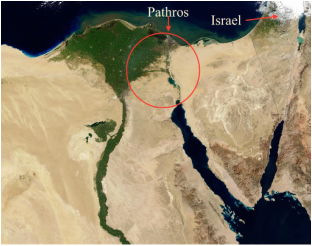Jeremiah Chapter 44 Lessons from the textStubbornness to Sin The Jews in this chapter chose to view their circumstances as a result of not offering incense to the “queen of heaven.” They completely failed to recognize the connection between leaving the Lord and their dire situation. They had already determined in their minds to serve other gods. The truth could not reach them because of this determination. They were, in fact, stubborn in their sin. How many of us have sins in our lives that are so ingrained in us that we fail to recognize them as sins? Often, we cannot see sin in our own lives, but someone else can see it in us. That is, you may not recognize bitterness inside of you but a friend who listens to the tone of your sarcasm knows that it’s there. In this chapter, Jeremiah does the honorable thing by trying to convince the people that their sin of idolatry is the cause of their situation and not their lack of burning incense to the queen of heaven. So, too, does the Scripture teach us to go to a brother who is overcome with a fault to try to reason with them to expose their sin (Gal. 6:1). After all, if you are unaware of your sin, how can you repent of it? The Jews of this chapter, however, were so convinced that their situation was a result of their failing to burn incense that they were not even open to the truth. It is not our responsibility to repent of things of which we are unaware, but it once it is made known to us then we are held accountable. Jesus made this clear in one of His rebukes of the Pharisees (Jn. 9:39-41). As children of God, we need to be asking the Holy Spirit daily to reveal to us any faults that we need to repent of. As part of the Trinity, it is His duty to convict us of sin, showing our error to us so that we can repent. Once He does so, then we have the obligation to turn from the sin. If we fail to repent, then we have chosen, in stubbornness, to continue in our sin. As this chapter reveals, God’s response to such stubbornness is destructions. If God has revealed a sin in your life, please turn from it today. Verse by Verse Commentary 1 Migdol, Tahpanhes, and Noph are the places where the children of Israel settle after refusing to heed God’s command to not go down into Egypt. Migdol is on the eastern outskirts of Egypt near the Red Sea (Exo. 14:2). Tahpanhes is located north of Migdol and is in the modern day Suez-Canal. Noph is the Jewish name for Cairo, which lies a little more inland of Egypt. Pathros is the name for region containing these cities. 2-6 God summarizes the events that have led the people into Egypt. He forewarned through the prophets that if the people would not turn from idolatry then He would allow their lands to be destroyed. Since they refused to repent of this sin, Nebuchadnezzar came and burned the land. Yet if the people had chosen to stay in Israel, God would have secured them a peaceful life (Jer. 42:10-12). Nonetheless, the people would not listen and left for Egypt. Despite seeing the judgment of God for themselves, they are inclined to turn away and do as they please, showing that their hearts are still towards other gods and not the True God. On serving gods that they have not before known see Deuteronomy 13:6. 7-8 Noteworthy is that God says that the evil they are committing is against their own souls. Rather than saying that it is a sin against Him, God is highlighting that the people’s choices are bringing harm to themselves. God wishes to bless and care for His people; choosing to leave God and His commandments for a different lifestyle will do one more hurt than good. The lifestyle may appear enticing, but the result thereof is death (Prov. 14:12). God makes it very clear that this choice to serve other gods will hurt not only themselves but also their children. Their actions are incurring the wrath of God to the point that they will be utterly destroyed, leaving no descendants. See also Jeremiah 24:8-10 for a prophecy concerning the destruction of those left after the deportation. 9-10 God reminds the people of the history of their nation. The sins of the Jews once they entered the land of Canaan brought continual judgment from other nations. God is telling them to consider history and learn from it. As God punished their fathers for idolatry, so will He punish them if they do not cease from it. This teaches one to take careful consideration of history to ensure that one does not repeat the same mistakes. 11-14 Just as God treated the Jews of the past, He will treat these present day Jews. Their sin has cut them off from His protection and provisions. The people were afraid to stay in Israel out of fear of war, famine, and drought (Jer. 42:14, 43:2-3). If they had stayed in the promised land, they would have been safe from these things, yet, because of their rebellion, the very things they fear will consume them. 15-19 The people refuse to listen to Jeremiah. They claim that as long as they were burning incense to other gods they were provided for. When they stopped, then destruction came on them. This is entirely twisted since their burning of incense caused God to bring destruction on them through Babylon and their brief stopping of the idolatry did not reflect any repentance in their heart to leave the false gods (see Jer. 34:8-11 for an example). If they had truly repented, they would have been blessed. This is evidenced by the abundant crop the Jews were gathering in the short two months under Gedaliah’s rule (Jer. 40:12). 20-23 Jeremiah reminds the people that their destruction is not result of stopping to burn incense to idols but is judgment from God for burning incense. The people are so far from God that they cannot recognize His hand against them. 24-25 Jeremiah knows the stubbornness of the people. Once they have set their minds to do something, they will do it regardless of how much Jeremiah tries to dissuade them. God Himself has repeatedly called the Jews a “stiffnecked” people (Exo. 32:9). 26-27 In response to the people’s stubbornness, God promises to perform evil against the people. Since they have chosen to ignore Him, He will completely let them go. Paul describes this as God turning them over to a reprobate mind; God allows one to completely forget about Him if one chooses sin over life (Rom. 1:28). 28-30 God displays His mercy. Even though the people have chosen idolatry over Him, He will still spare a small remnant to return to the promised land. Despite everything, God still remembers the prayers of Moses and therefore will not completely destroy Israel (Deut. 9:25-29, Jer. 31:35-36). Noteworthy is that God will use this judgment against the Jews and Egypt as a sign; because His words will come to pass, this prophecy is a testimony of His existence and divine authority. God is always trying to let humanity know that He is real and that His words stand true. ___________________ Thank you for your faithfulness in studying God’s word. Please comment below to share what you learned from today's lesson.
0 Comments
Leave a Reply. |
Devotional Categories
All
Archives
September 2023
|
|
Join my mailing list!
|
Thank you!You have successfully joined our subscriber list. |
|
© 2024 Melissa Beaty
|
